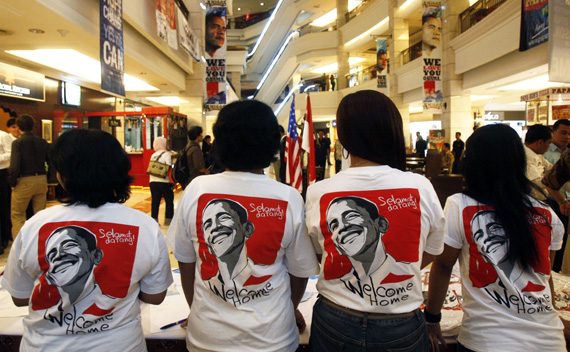Obama and Asia, Part Deux
More on:

My colleague Elizabeth Economy raises some important points about my article in Newsweek, but I think that, overall, she takes a far too rosy view of the White House’s efforts, and its rewards, in Asia. Much of the polling data showing the White House’s popularity or favorability in Asia, for example, reflects as much Asian enthusiasm for Obama, and dislike for his predecessor George W. Bush, as it does any real regional response to the Obama administration’s efforts, or lack thereof, in the region. In Indonesia specifically, the favorability rating reflects Obama’s status as a kind of “local boy,” having spent part of his childhood there; by contrast, specific elements of the mooted US-Indonesia comprehensive partnership are not necessarily popular in important segments in Indonesia, including a renewed relationship with Kopassus.
I do, as Liz notes, acknowledge when the administration has made headway. However, even some of the supposed triumphs are not necessarily so. The U.S.-South Korea free trade deal was negotiated by the previous administration, and despite Obama’s vow to move forward with it, the conditions he might attach to rethinking it may well kill it anyway, thereby both raising Seoul’s hopes and crushing them at the same time. The Trans-Pacific Partnership, meanwhile, is not an initiative launched by the Obama administration – it was started by Chile, Singapore, and New Zealand, and joined by the United States years later. The Obama administration, as even some administration officials admit in private, highlighted the TPP during the president’s visit to Asia last year exactly because the White House did not have any other good news on trade to offer, and TPP is so far from coming into reality that Washington could support it without having to face any real consequences of that support.
Liz’s criticisms of my critique of China policy are reasonable, and perhaps some of my points got too compressed in the article. I do believe that the administration’s conciliatory moves toward China earlier on alienated India, Singapore, and to some extent the Philippines. By contrast, I think that, at times, the White House’s lack of attention to the region has pushed other countries – namely, Indonesia, Cambodia, Thailand, and at times Japan closer to Beijing.
However, to ask “are we really worried” about China’s soft power compared to that of the United States is too trusting in the United States’ long-term roots in the region. Yes, polling data comparing the United States and China’s popularity now shows the United States ahead, just as several years ago, when I did research for my first book, it showed China ahead – again, the polls then were skewed by the response to George W. Bush and now have been skewed by the personal popularity of Obama. Were Obama to be replaced by a figure with less global popularity, like Sarah Palin, you might see the figures reverse once again.
But the underlying trends surely must cause U.S. policymakers to worry: regional economic integration occurring largely without the United States and now including even Taiwan, even if the US-Korea deal actually by some miracle is finalized; Chinese outreach to Indonesian students and academics, even as Washington has ignored the Indonesians’ desire to include Peace Corps programs to send Indonesians to the US; growing Chinese aid across mainland Southeast Asia, which has emboldened leaders like Hun Sen and in part prompted the US to re-engage with regimes like the Burmese junta; and rising Chinese projection into areas, like Bangladesh and Sri Lanka, where the US already had weak historical links.
One popular president can’t forestall all those trends.
More on:
 Online Store
Online Store